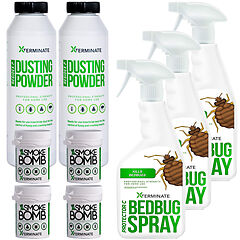
June 9th, 2021 by
Tiny bugs living in your bed and sucking your blood as you sleep could form the premise of a horror movie and yet they are surprisingly commonplace in households all over the UK. Perhaps because the thought of bed bugs is so loathsome, there’s a significant social stigma around them, which means people may be embarrassed to seek help. This is one of many reasons bed bugs are so widespread, as once they’re established they can be a nightmare to get rid of. It’s crucial to take action as soon as possible to give yourself the best chance of success. It helps to know exactly what you’re dealing with when coming up against bed bugs, so we’ll lay out a few myths below - and bust them – to help you identify and deal with them.
1. Bed bugs are only found in beds
 This is certainly what their name suggests, isn’t it? While your bed may be the last place you want them, we have to break the news that this is not the only place they inhabit. The truth is they like any type of soft surface including clothes, sofas, vehicle seats etc. What they do need is access to their food source – blood. Therefore, beds do make the perfect habitat due to their proximity to people (and for long periods of time too).
This is certainly what their name suggests, isn’t it? While your bed may be the last place you want them, we have to break the news that this is not the only place they inhabit. The truth is they like any type of soft surface including clothes, sofas, vehicle seats etc. What they do need is access to their food source – blood. Therefore, beds do make the perfect habitat due to their proximity to people (and for long periods of time too).
Not only can you find bed bugs in all these surfaces; you can bring them into your home from coming into contact with them in other places, such as from a hotel or a bus seat. In fact, this is the most common way bed bugs are brought into the home, so you should be careful on your travels.
2. Bed bugs are attracted to dirty sheets
Bed bugs in your bed would certainly make you feel dirty, and the chances are, your sheets may also seem dirty as they can feel ‘gritty, which is the result of all the discarded skin, eggs, and droppings created by the infestation. However, they are not attracted to dirt, so you don’t get them from not washing your sheets. The truth is that they don’t really care whether your sheets are clean or dirty, the only thing they are interested in is the perfect environment: a warm place with access to a host to feed on. They can be found in five-star hotels and luxury mansions, so a bed bug infestation doesn’t mean you’re somehow unclean. On the other side of the coin, this also means a strict cleaning regime isn’t necessarily a defence against bed bugs, so you should always be vigilant no matter where you’re sleeping.
3. Bed bugs are only active in the summer
As an indoor pest that is not affected by weather and outdoor temperatures, bed bugs can thrive all year round. The source of this myth lies in their propensity to reproduce, which is vastly accelerated in the summer when it’s warm. Not only do they tend to breed faster during the summer, our own increase in activity – we all spend more time out and about in summer - also helps them spread more easily.
While this means you may be more likely to see signs of an infestation in summer, you still need to be vigilant all year round.
Protector C Super Insect Killer Spray and Growth Regulator 5L
Price: £41.99
Buy Now
4. Bed bugs only bite humans
Bed bugs can feed on any warm-blooded animal. However, humans tend to be easier hosts as we don’t have thick hair or fur to get through to bite.
However, this does mean that they are equally able to live in pet beds so if you regularly treat your animals for fleas and ticks, but they still appear to be scratching, you may have to consider the possibility of bed bugs.
Bed Bug Killer Treatment Kit (3 Bedroom)
Price: £65.94
Buy Now
5. Bed bugs are easy to eradicate
A common misconception is that washing bedding at a high temperature will get rid of bed bugs. It will kill the bugs that are on the bedding, but it’s impossible to eradicate an infestation in this way because they are also likely to be living in pillows, duvets, mattresses, and even headboards. These areas are all much harder to clean.
They are actually quite difficult to get rid of; they are very small, they’re good at hiding, they are high in number, and they are very resilient. They can even continue to lay eggs after being treated to ensure continuity of the infestation.
They’re not impossible though; they just need a combination of treatments to attack a number of fronts. Smoke fumers will penetrate into all the tiny hiding places, dusting powders and sprays can be applied directly to the bed and surrounding area, and Protector C spray will actually halt their life cycle, preventing them from reproducing. (All these can be bought as a complete kit). It’s also important to repeat these treatments again 2-3 times over the next few weeks to capture any rogue bugs that managed to survive the initial onslaught.
Comments
Leave a reply
Your e-mail address will not be published. All fields are required


